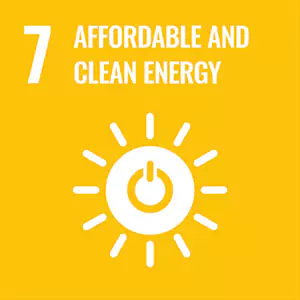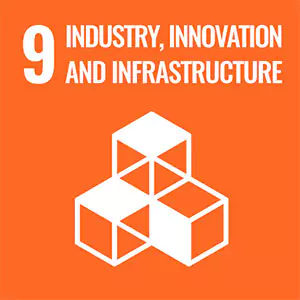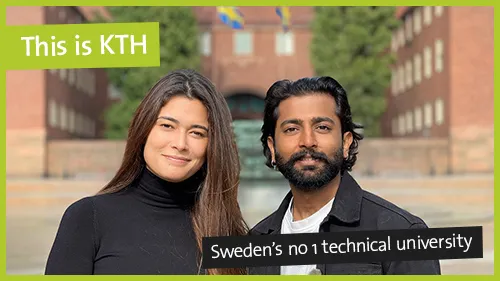MSc Chemical Engineering for Energy and Environment
The master’s programme in Chemical Engineering for Energy and Environment equips students with advanced knowledge and practical tools to design various processes along the value chain, from raw materials to final products. You will learn to analyse and design processes crucial for sustainable energy, clean water, emissions reduction, and circular resource flows, preparing you to tackle global challenges in energy and environmental sustainability.

Chemical Engineering for Energy and Environment at KTH
In this programme, you will acquire advanced knowledge and skills in chemical engineering and modern tools to analyse various processes. These processes can be anything from producing biofuels and energy storage to purifying drinking water and exhaust gases. You will gain competence across the entire chain, from raw materials to the final product. Analyses of the processes often encompass aspects such as chemicals, heat, electricity, and the environment.
This is a two-year programme (120 ECTS credits) in English. Graduates are awarded the degree of Master of Science. The programme is given mainly at KTH Campus in Stockholm by the School of Engineering Sciences in Chemistry, Biotechnology and Health (at KTH).
Year one consists of one mandatory course in scientific theory and methodology, alongside elective courses you can choose based on your academic background and interests. Year two includes a mandatory project course in process design, plus further electives allowing you to tailor your studies to your personal and professional goals. The final semester of year two is dedicated to completing a degree project at either a company, KTH, or another university or research institute worldwide.
Complementary skills such as problem-solving, teamwork, and written and spoken communication are emphasised in many courses through seminars and project assignments to complement traditional lectures. Many of the courses also include laboratory work in the research labs. The education is closely linked to the research conducted at the School of Engineering Sciences in Chemistry, Biotechnology and Health at KTH in general, and the Department of Chemical Engineering in particular. Ongoing research fields that can be mentioned are batteries, carbon capture and storage, fuel cells, hydrogen systems, renewable fuel production, and resource recovery.
The programme also has close links to the Swedish industry, especially the motor vehicle industry through Scania and Volvo, and the energy utility industry through Vattenfall and Stockholm Exergi. The programme also offers a strong foundation for international activities, as most teachers have close connections with foreign universities and companies. For instance, there are good opportunities to study parts of the programme abroad through exchange programmes at other leading universities in chemical engineering or to carry out the degree project overseas.
Courses in the programme
The courses in the programme cover topics such as separation processes, transport phenomena, energy conversion systems, electrochemistry, batteries, fuel cells, environmental catalysis, exhaust gas cleaning, and sustainability issues related to energy conversion, chemical production and resource recovery.
Courses in the programme Chemical Engineering for Energy and Environment
Future and career
The job market for engineers graduating from the programme is broad and international. Advanced skills in chemical engineering combined with an environmental focus provide an excellent foundation for various careers in industry, government agencies, and academia.
Chemical engineers specialising in energy and the environment are very attractive to many branches of industry, such as suppliers of energy carriers and chemicals, the pulp and paper industry, the vehicle industry, and companies specialising in environmental issues such as material recycling.
After graduation, you can expect to take on roles such as project leader for development and production, production manager, quality assurance officer, product specialist, process engineer or research engineer at a research institute. Programme graduates can be found in traditional Swedish industries, small start-ups, consultant companies, governmental institutions, research institutes and universities.
Examples of companies employing KTH chemical engineers include energy utility firms such as Fortum, Stockholm Exergi, and Vattenfall; pulp and paper industry companies like Holmen and Stora Enso; research institutes such as RISE and IVL; chemical production companies such as Akzo Nobel and Nynäs; and vehicle manufacturing firms like Scania (buses and trucks), Volvo AB (buses, trucks, and construction machinery), and Volvo Cars (cars).
Many graduates also continue their academic careers pursuing doctoral-level studies. The demand for engineers with the competence provided by the programme is expected to remain high in the future.
Sustainable development
Graduates from KTH have the knowledge and tools for moving society in a more sustainable direction, as sustainable development is an integral part of all programmes. The three sustainable development goals of the United Nations that best align with the focus of the master’s programme in Chemical Engineering for Energy and Environment are:



These goals aim to develop a sustainable society through innovation and technological progress. The programme offers tools for creating future sustainable heat, electricity, and material production systems, including environmentally friendly technologies such as batteries and fuel cells. It also enables the development of new chemical engineering processes, like sustainable resource recovery, which is a key challenge in transitioning to a circular economy.
Faculty and research
The master’s programme in Chemical Engineering for Energy and Environment is given by the Department of Chemical Engineering at the KTH School of Engineering Sciences in Chemistry, Biotechnology and Health.






